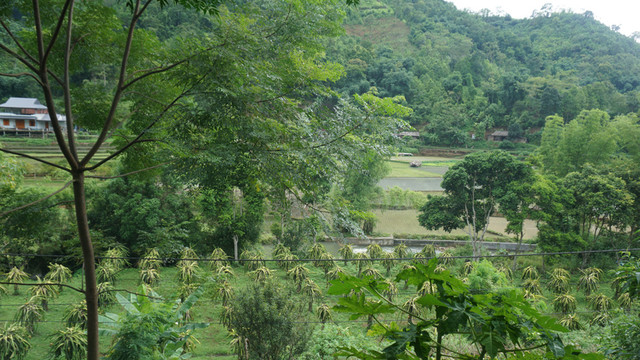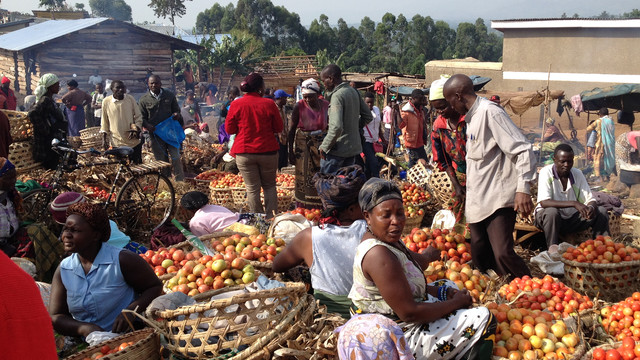Climate action is being held back by ‘hidden handbrakes’
Despite global efforts to tackle the devastating effects of climate change, we are falling short of meeting the world's climate goals. What is hindering our progress?


Farm land bordering an industrial area in Vanderbijlpark, South Africa (Photo: John Hogg/World Bank, via Flickr, CC BY-NC-ND 2.0)
Progress on cutting emissions, adapting to climate impacts, and addressing loss and damage is still far too slow to avoid a bleak future for humanity.
While there are recent signs the transition to renewable energy is speeding up, the latest assessment report from the Intergovernmental Panel on Climate Change (IPCC) concluded that carbon emissions must reduce by 48% by 2030 to have any real chance of limiting global warming to 1.5°C. Even with all the action promised, we are currently on track for 2.7°C by 2100.
The IPCC also found that many of the policy and practical tools we need are now at our disposal and are more cost-effective than the high carbon alternatives.
So, what’s holding us back? While many of the reasons – like money and geopolitics – are well known, there are several major blockers to tackling climate change that are barely discussed and far from the public eye. What are some of these 'hidden handbrakes'?
There are thousands of trade agreements active globally, many of which give protection to investors, including fossil fuel investors. Clauses in the agreements allow action by governments that threatens the value of those investments to be challenged in international courts, and many clauses give protection decades into the future.
According to latest estimates, this ‘investor state dispute settlements’ mechanism means that global climate action could cost governments upwards of US$340 billion in pay-outs to coal, oil and gas investors – and the risk of legal action is undoubtedly preventing faster progress.
To put this in perspective, total government spending globally on pro-climate measures in 2020 was $321bn. In just one example, a British oil company successfully sued the Italian government for $190m when the parliament banned all drilling within 12 miles of the coast, blocking one of their planned projects. A coal phaseout in the Netherlands also triggered legal claims. Research conducted by IIED has shown that most foreign-owned coal plants around the world are protected by at least one investment treaty.
Debt burden
But this is just one of many hidden handbrakes blocking action to halt climate change. Another example is the money needed to service national debt.
The 37 Small Island Developing States (SIDS) together received $1.5bn in total international finance for climate action between 2016 and 2020, while in the same period, just 22 paid $26.6bn to their external creditors. So, for every $1 mobilised for climate action, these countries were paying at least $18 to rich banks headquartered in global financial centres and other creditors.
The amount developing countries collectively spend on debt servicing is estimated at $310bn in 2022, and $43bn for the world’s least developed countries, dwarfing all measures of finance for climate action. Given that indebtedness is now fuelled by climate-related disasters and less than 10% of climate finance is reaching vulnerable people who need it most, we are effectively asking those who have done least to cause the problem to shoulder the biggest burden.
Preliminary work by IIED suggests there are many other hidden handbrakes too:
- Vast subsidies for industries which damage the climate including agriculture, animal feed supplies, and the manufacture of steel, cement, and concrete
- The legal contracts or agreements that make the intended beneficiaries of climate finance liable for underperformance when often the bureaucracy is stifling, and
- Complex permitting and procurement rules that make it almost impossible for those bringing new climate-friendly technologies to apply and scale their solutions.
In partnership with The Generation Foundation, IIED is setting out to gather and explore these hidden handbrakes, as we call them, and expose them to wider scrutiny and action.
Greater public awareness of all the factors holding us back from rapid action should allow more people to decide whether these ‘handbrakes’ should continue, and whether they are compatible with the kind of world we want to live in.
We hope this can lead to direct action that exposes the deep code in society and economies protecting the status quo, so that we can take off the handbrakes and speed up our transition to a cleaner, sustainable future.
This blog was originally posted on the Context by Thomson Reuters Foundation website.


